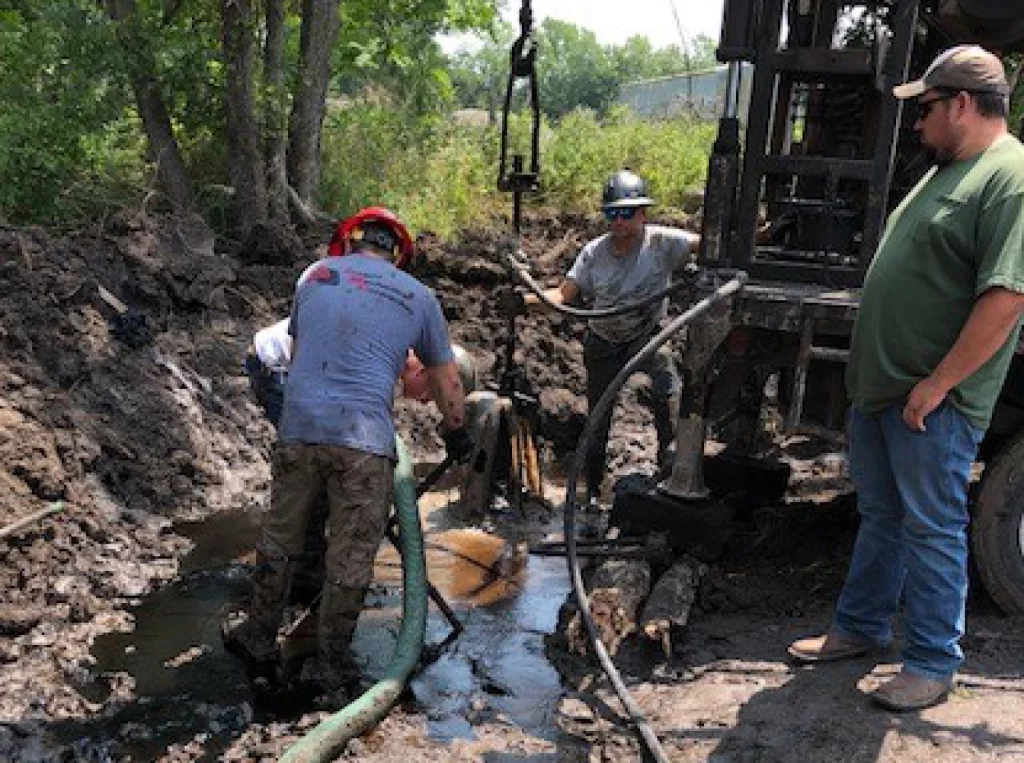Kansas- Last summer, a utility worker stumbled across a well — one of thousands of abandoned, unplugged oil and gas wells scattered across Kansas — just 15 feet from a stream in La Cygne, an hour south of Kansas City.
Such sites bear witness to the state’s history of fossil fuel production — and they can leak pollutants into the air and water generations after they’ve been forgotten.
Tens of millions of federal tax dollars will help the state seal thousands of openings over the next several years, though many will remain unaddressed.
Old wells in Kansas can date back to the start of oil and gas drilling in the region in the mid-1800s.
Operators behind unprofitable sites often walked away without plugging the holes properly — if at all.
Unplugged wells can leak methane, a powerful greenhouse gas, into the atmosphere. Their pipes can break, letting in groundwater that disappears down the holes forever.
Other times, changes in pressure can push contaminated fluids from the bottom of the wellbore toward the surface, where it seeps into the surrounding earth and water.
So closing the holes involves more than sealing the top. Workers have to fill much or all of the underground pipes. It took 120 sacks of cement to plug the La Cygne well.

Landowners continue to discover long-forgotten wells.
“A farmer may see a wet spot in their field. Or there may be a puddle that bubbles,” said Ryan Hoffman, director of the Kansas Corporation Commission’s conservation division. “It could be you’re just out walking in the woods and you find something.”
The agency, which regulates oil and gas, investigates. It looks for any records of who drilled, but many of the sites predate modern regulation and recordkeeping. Or else the companies no longer exist.
So Kansas adds the sites to its formidable to-do list.
Sometimes, the wells aren’t even that old.
In 2014, the Commission found a leaky well drilled in 1982 and closed just two years later by a company that no longer existed. So the agency paid to re-plug it.
Federal dollars will speed the work
In a typical year, Kansas manages to plug a couple of hundred abandoned wells. Since it started charging a fee to oil and gas companies in the 1990s to help pay for that work, the state has knocked 11,000 wells off its to-do list.
But state officials say it’s likely that just as many remain.
The wells that pose the most obvious risk to people and groundwater — like the situations in La Cygne and Wichita — get priority.
Last year’s federal infrastructure legislation puts billions of dollars toward speeding the effort to seal abandoned wells across the country.
The Kansas Corporation Commission gets $25 million to plug about 2,300 wells over the next two to three years. Those wells are scattered across the state.
After that, the KCC could get another $33.6 million to seal a few thousand more.

Kansas will seek bids soon to start the federally funded work. Hoffman hopes a tight labor market won’t slow progress.
“It’s the unknown,” Hoffman said. “Are we gonna be able to find people who are willing to come do the work?”
Celia Llopis-Jepsen is a reporter for the Kansas News Service. You can follow her on Twitter @celia_LJ or email her at celia (at) kcur (dot) org.
The Kansas News Service is a collaboration of KCUR, Kansas Public Radio, KMUW and High Plains Public Radio focused on health, the social determinants of health and their connection to public policy.
Kansas News Service stories and photos may be republished by news media at no cost with proper attribution and a link to ksnewsservice.org.













